USF carries the banner for social marketing
20th anniversary conference features field’s early pioneers and looks ahead
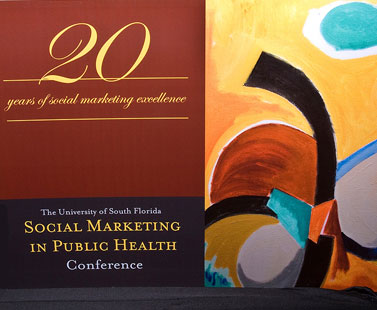
The University of South Florida College of Public Health’s annual social marketing conference continues to carry the banner for the discipline as the cadre of skilled social marketers grows and expands applications beyond health.
“USF’s conference has done more to advance social marketing than any other single effort I know,” said Philip Kotler, PhD, distinguished professor of international marketing at the Kellogg Graduate School of Management, Northwestern University.
Kotler, who coined the term “social marketing,” joined colleagues Alan Andreasen, PhD, and Bill Novelli to offer their perspectives on the past, present and future of the field at the 20th Anniversary Social Marketing in Public Health Conference. The trio, known as the “Founding Fathers of Social Marketing” spoke at the milestone conference, held June 11 and 12, in Clearwater Beach, FL. More than 300 attendees, including leading social marketing professionals, gathered from 36 U.S. states and nine countries, including China, Australia and the island nation of Palau.
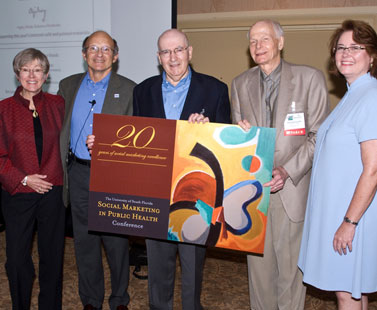
Co-directors of the 20th anniversary conference Carol Bryant (left) and Kelli McCormack Brown flank the three “Founding Fathers” of social marketing, l to r, Bill Novelli, Philip Kotler and Alan Andreasen.
The three early pioneers of social marketing each contributed to the evolution of the field, which applies the principles and techniques of commercial marketing in an attempt to persuade target audiences to change their behavior to benefit themselves and society in general. Consumer-focused research and evaluation are a vital part of the social marketing process.
Kotler said that the social marketing community, like advertising, is shifting to a greater emphasis on emotions rather than ideas as the precipitators of action. “Smokers, drug users, overeaters and others often know better, but fail to do better,” he said. “Getting people to accept something new requires a substitute for the behavior you want to change… for example chewing gum instead of smoking.”
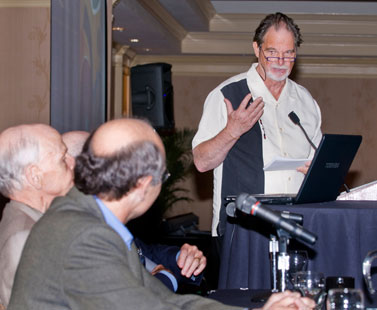
Keynote speaker Bill Smith, executive director of the Academy for Educational Development, moderated the Founding Fathers of Social Marketing panel. An original painting by Smith was used in the conference’s 20th anniversary poster pictured above.
Andreasen, professor and executive director of the Social Marketing Institute at Georgetown University, reviewed the major advances in social marketing since the 1990s. Once dominated by health care, the application of social marketing continues to broaden to other areas, including the environment, criminal justice and finance, Andreasen said. At the same time, more social marketers are focusing their efforts at the systems level – targeting legislators, policy makers and other leaders who can influence the behavior and opportunities of target audiences.
“Behavior can be constrained by barriers. For instance, kids who want to exercise may find their playgrounds frequented by drug dealers and their schools’ physical education teachers and coaching positions cut,” Andreasen said. “Social marketing has to persuade school principals to create new opportunities for exercise, and figure out how to get legislators to change their behavior so they reward school systems that value physical activity.”
More work is needed to build the brand of social marketing (behavior not ideas), measure its effectiveness, increase the buy-in of senior management, and tap into the power of social media like Facebook, Twitter and blogs to reach new stakeholders, Andreasen added.
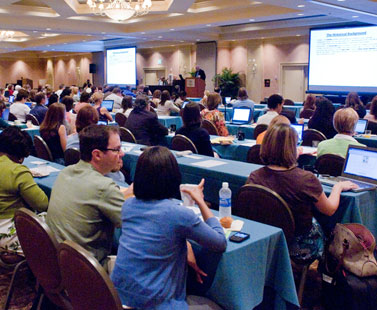
More than 300 people from 36 U.S. states and nine countries attended.
Novelli helped lead the Campaign for Tobacco-Free Kids, one of the first major social marketing initiatives to emphasize policy advocacy in its efforts to protect children from tobacco addiction and secondhand smoke exposure. The campaign worked strategically to decrease consumption of tobacco with tax increases and for FDA oversight of tobacco products.
Novelli, founder of the worldwide public relations agency Porter Novelli and former CEO of AARP, described two trends he sees with implications for social marketing. The first is the slip backwards in health and well-being in the United States. Many indicators of healthy behavior – including healthy weight, regular exercise, and eating fruits and vegetables – have declined, Novelli said. The second is increased government support for prevention research, including funding sources for social marketing in the new healthcare reform legislation, and more willingness by employers to create health promotion and disease prevention programs at work.
“While healthy behavior is down, social pressure to combat that change is up,” Novelli said. “There is no shortage of opportunities to advance the cause of social change and make the world a better place.”
Among the conference attendees was Beverly Schwartz, a planning committee member, who hasn’t missed a single USF social marketing conference in the last 20 years. Schwartz was one of the first in a federal agency to formally hold a social marketing position – in the Centers for Disease Control and Prevention (CDC) Division of HIV/AIDS during the early AIDS awareness campaigns.
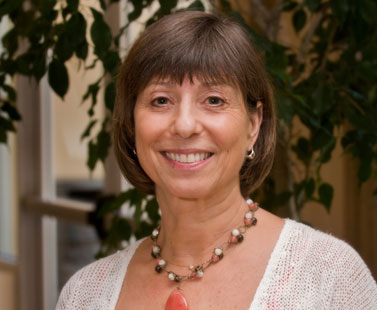
Planning committee member Beverly Schwartz, among the first to hold a formal social marketing position in a federal agency, has attended all 20 of the USF College of Public Health’s socal marketing conferences.
“The first conference was small and intimate; there were less than 50 people,” said Schwartz, now senior marketing counsel for Ashoka, a global association advancing social entrepreneurship. “It’s been great to see this conference grow and become more sophisticated over the years. USF has helped build networks of skilled social marketers and continues to develop the technical expertise to be a leader the field.”
Among the conference’s featured speakers was Carol Bryant, PhD, co-director of the USF College of Public Health’s Florida Prevention Research Center, one of 37 comprehensive health promotion and disease prevention centers nationwide funded by the CDC. The center has applied community-based social marketing and evidence-based research to a variety of projects, including childhood obesity prevention, promoting eye safety among citrus workers, and preventing initiation of tobacco and alcohol use among middle school students.
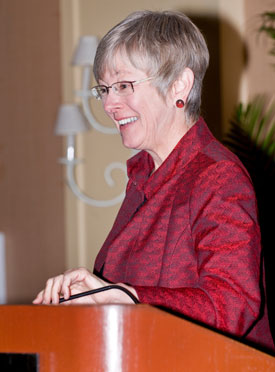
Carol Bryant talked about lessons learned from community-based social marketing projects implemented by the Florida Prevention Research Center at USF.
“When you partner with people in the community, you tap into their community wisdom and control … and the community’s ability to identify, analyze and find solutions to big social problems,” said Bryant, a distinguished USF Health professor. The result, Bryant added, has been more sustainable projects and a better return on investment for taxpayers.
The demand for social marketing is gaining momentum from several sources, including recent environmental disasters and pressures, the recession, social media growth, and a Millennial generation that wants to give back, Kotler said. “I think we’re really going to take off. In a few years, we may need a stadium to hold everyone, not a hotel conference room.”
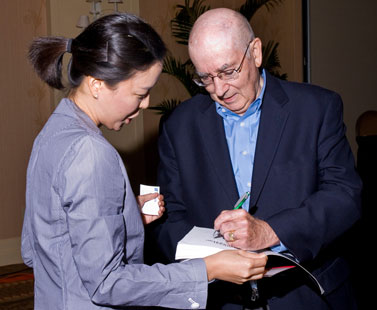
Philip Kotler signs a copy of a book he co-authored, “Social Marketing: Influencing Behaviors for Good,” for Jaejin Lee, a University of Florida PhD student in advertising. Lee was a conference scholarship recipient.
Story by Anne DeLotto Baier, USF Health Communications, and photos by Gil Williams Photography

